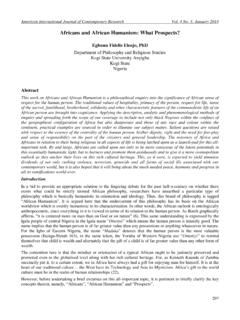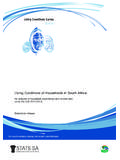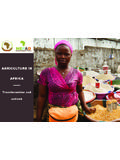Transcription of FROM AN AFRICAN ONTOLOGY TO AN AFRICAN …
1 QUEST: An AFRICAN Journal of Philosophy / Revue Africaine de Philosophie XVIII: 25-36. FROM AN AFRICAN ONTOLOGY TO AN AFRICAN epistemology . A critique of Mbiti on the time conception of Africans by Moses k . ABSTRACT. The ontological thesis that this paper focuses on is the claim of Mbiti that Africans lack the concept of future time. The ontological core of the traditional view of time reported by Mbiti is that to constitute time is to be lived through'. With reference to perception, since existence in space presupposes existence in time, it should follow from the premise that time is essentially experienced time only' that to exist is to exist in time alone'. Assuming that Mbiti's claim about Africans' conception of time is true, Africans should be incapable of conceiving a perception-transcending or knowledge- transcending world. In which case, they should be incapable of a scientific epistemol- ogy. Given that it is living humans that have experiences and reckon with time, this posi- tion, in the context of Mbiti's thesis that Africans lack the concept of future time, is ambivalent and needs to be further explicated.
2 The paper has undertaken an explication of the epistemological consequences of such position. Although the general laxity of Afri- cans about time, especially future time, pervades their collective attitude to work, the best we can say is that they lack time-discipline', not that they do not have the concept of future time. A philosophically significant concern with the AFRICAN concept of time, there- fore, no matter what it is, should be highly critical of received notions and should point out the consequences of holding an unprogressive outdated idea of time or time-related patterns of behavior. In this regard, Mbiti ought to have pointed out the grave dangers inherent in a futureless' conception of time such as he attributed to Africans. This would have helped the people to adopt a better conception of time that could lead to improve- ment in their lives, and that could better guarantee their survival and independence as a race. KEY WORDS: Africans, discipline, epistemology , experience, future, knowledge, Mbiti, ONTOLOGY , perception, time, transcendence Introduction John Mbiti is famous for his work AFRICAN Religions and Philosophy, 1 in 1.
3 Mbiti, AFRICAN Religions and Philosophy, New York: Double Day and Co. Inc., 1970, especially pp. 19-36. 2005 QUEST: An AFRICAN Journal of Philosophy / Revue Africaine de Philosophie ISSN 1011-226. for reprinting, anthologising, reproduction, subscriptions, back issues, submission of articles, and directions for authors: Moses k . which he attributes a conception of time to Africans. A crucial part of Mbiti's objectives was to discuss the AFRICAN concept of time as the key to our understanding of the basic reli- 2. gious and philosophical concepts . of Africans. He believed that a study of the concept of time might enhance our understanding of the thoughts, practices, values and designs for living of AFRICAN In short, Mbiti was of the opinion that from the ONTOLOGY that Africans have, we can articulate the philosophical systems of different AFRICAN peoples. That is, we can from such ONTOLOGY arrive at the understanding, attitude of mind, logic and perception behind the manner in 4.
4 Which AFRICAN people think, act or speak in different situations of life.. Given the foregoing, Mbiti appears to have envisaged the possibility of the movement from ONTOLOGY to epistemology that this paper sets out to do, although he did not make it. The possibility of such a movement had also been suggested to the effect that a critical AFRICAN perspective on empirical knowledge could be constructed from Mbiti's account of an AFRICAN concep- tion of Mbiti's treatment of time as an ontological phenomenon that pertains to the question of existence or being, 6 provides the basis for the analysis that this paper attempts. The analytical movement from ONTOLOGY to episte- mology consists in examining the conception of empirical knowledge that may be implicit in an idea of time. Given7 that concepts always occur in clusters, the movement presupposes that there are theoretical and practical 2. Ibid; 20-21. 3. Ibid; 21. 4. Ibid; 2. 5. M. Akin.
5 Makinde, Of Chance Philosophy and Obsolete Philosophy: Some Anti- Scientific Features of AFRICAN (Traditional) Thought , in Second Order (new series): An AFRICAN Journal of Philosophy, vol. 1, no. 1 (Jan. 1988): 8-15. 6. J. S. Mbiti, AFRICAN Religions and Philosophy: 15. 7. M. k , The Nature of Political Concepts and Ideologies, Ibadan: Hope Publications, 2001: 12. 26. A critique of Mbiti on AFRICAN time links between the ontological issues of time and existence and the epistemo- logical issues of experience and our knowledge of the external The discussion in this paper will therefore involve an explication of the intercon- nections between the ideas of time, existence, experience and knowledge of the external world, and life that can be constructed out of Mbiti's reported AFRICAN concept of time. Critique of Mbiti The ontological thesis that this paper focuses on is the claim of Mbiti that Africans lack the concept of future This concept of time that Mbiti attributes to Africans has already received attention of scholars on several grounds different from the present As already indicated above, the 8.
6 For related discussions, see M. k , Towards an AFRICAN (Yoruba) Theory of Empiri- cal Knowledge: A Critique of Hallen and Sodipo in International Philosophical Quar- terly, XXXV (2), 1995: 205-216; and Barry Hallen, Moral epistemology When Propositions Come Out of Mouths: Reply to k , International Philosophical Quar- terly, XXXVIII (2), 1998: 187-204. 9. Mbiti, AFRICAN Religions and Philosophy, pp. 21-23. He says here, for example, that what is not now occurring or certain to occur immediately belongs to the category of No-time such that time is a two-dimensional phenomenon, with a long past, a present, and virtually no future. (21). 10. Cases in point are: (a) Masolo, in AFRICAN Philosophy in Search of Identity, Bloomington: Indiana University Press, and Edinburgh: Edinburgh University Press Ltd., 1994: 103- 104, gathers some of these criticisms as follows: o Mbiti did not provide the philosophical analysis of the ONTOLOGY that he described, o Mbiti's work on AFRICAN philosophy' is obscure; he does not say what he means by AFRICAN Philosophy, o Mbiti merely parades AFRICAN traditional beliefs ( mythology) as phi- losophy' , and o Mbiti did not separate AFRICAN philosophy' from AFRICAN religious con- cepts.
7 27. Moses k . concept of time is closely related to the concepts of perception and the ex- ternal world. It is this connection that we shall now proceed to explicate. The ontological core of the traditional view of time reported by Mbiti is that to constitute time is to be lived through.. As such, time is either present time or used time.. With reference to perception, since existence in space presupposes existence in time, it should follow from the premise that time is essentially experienced time only that to exist is to exist in time alone.. This consequence may be seen as identical with the Berkeleyan esse est percipi' thesis ( to be is to be experienced'). The direct implication of this for perceptual knowledge will be that to be known is to be perceived either in the present or in the past'. Thus, if Africans lack the concept of future time, they should logically be incapable of conceiving objects either to exist (b) Segun Gbadegesin, in his AFRICAN Philosophy: Traditional Yoruba Philosophy and Contemporary AFRICAN Realities, New York: Peter Lang, 1991, p.
8 22, says Mbiti's thesis is merely a report of a communal world-view without an attempt to evalu- ate it. (c) Makinde, in his Of Chance Philosophy and Obsolete Philosophy (above), de- scribes Mbiti's discussion of the AFRICAN concept of time as a specimen of chance and obsolete philosophy', because it is uncritical and so unsuitable for improving the lot of Africa and Africans in the face of contemporary realities; to be consid- ered philosophical, Mbiti's account, assuming it is correct, needs to include a critical analysis that can lead to a corrective synthesis on the nature of time. (d) Based on linguistic considerations in his Akan culture, Gyekye finds Mbiti's ac- count both false and fallacious. False, because it is not the case that Akans lacked the concept of future time; and fallacious because Mbiti too hastily generalized from what he observed (assuming that it is true) of a very small part of Africa to the whole of Africa. See: Kwame Gyekye, AFRICAN Religions and Philosophy by Mbiti, a review article in Second Order, vol.
9 IV, no 1, Jan. 1975: 86-94. See also, Alexis Kagame, The Empirical Apperception of Time and the Conception of History in Bantu Thought , in Culture and Time, The UNESCO Press, 1976, pp. 101-102. 28. A critique of Mbiti on AFRICAN time unexperienced or to possess unsensed qualities. It should follow, therefore, that for Mbiti's Africans who lack the idea of future time, a past experience could not be projected into the future, which is no time. Hence, if an object or event does not co-exist with present experience, then it does not exist and probably it never existed. The truth of the foregoing consequences would imply that Africans are some kind of ontological immaterialists and episte- mological idealists. In which case, they will be neither metaphysical realists nor epistemological realists. Given the truth of Mbiti's claim about Africans' concept of time, Afri- cans should be incapable of conceiving a perception-transcending or knowledge-transcending This is because a conception of time that excludes the future cannot be compatible with a conception of a world that is self-subsistent or a world of things, processes and events having an endur- ing identity of its own.
10 12 By extension, such a conception of time will be incapable of sustaining a conceptual scheme, or be compatible with such a scheme, in which direct objective knowledge of the external world is granted possible. In order for such knowledge to be possible, the object of knowledge, the world, must be physically or mate- rially real, meaning that it must be 13. a permanent possibility of sensations actual or possible.. In order to be such a world, it must, in addition admit universality of ac- cess and exhibit autonomy or independence. 14 These features will ensure that the world transcends any set of occurrent finite perceptions. Such a world can however not exist and knowledge of such a world cannot be claimed by anyone whose conception of time is limited to only the present 11. Nicholas Rescher, epistemology : An Introduction to the Theory of Knowledge, Albany: State University of New York Press, 2003, p. 348. 12. Rescher, p. 348. 13. J.







